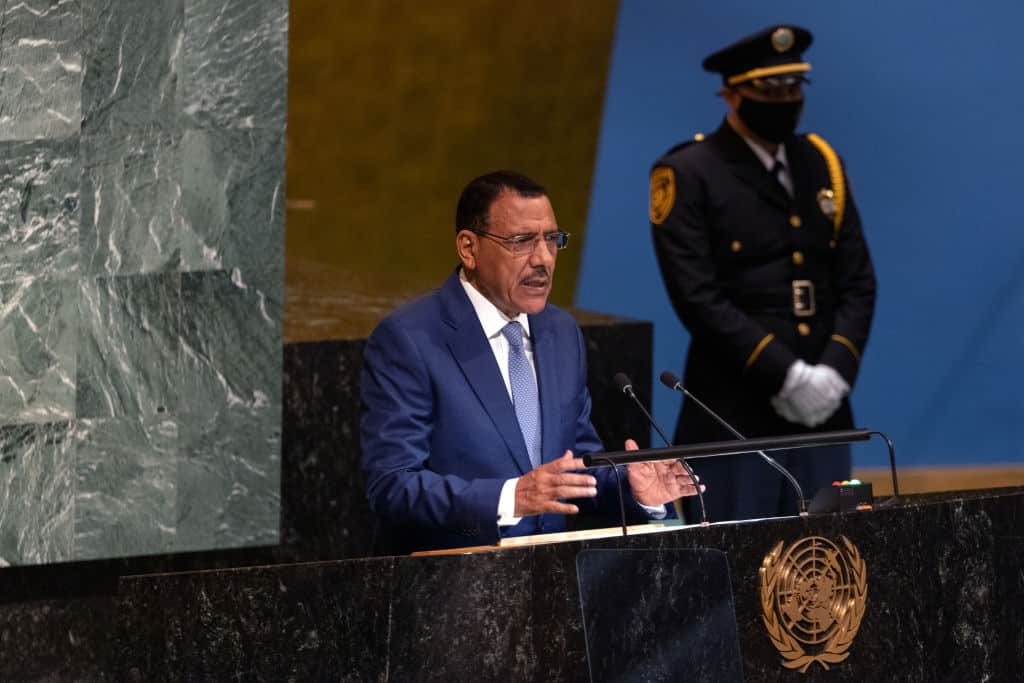TOPLINE
Niger’s military junta announced plans to charge ousted President Mohamed Bazoum with “high treason” and undermining national security, defying international pressure to release and reinstate the democratically elected leader and raising tensions in the region just hours after coup leaders signaled they were open to explore diplomatic solutions to the growing crisis.
KEY FACTS
In a statement delivered on state television Sunday night, junta spokesman Colonel Major Amadou Abdramane vowed to prosecute Bazoum “for high treason and for undermining the internal and external security of Niger.”
Abdramane said the military regime, which ousted and replaced Bazoum’s democratically elected government in July, had now gathered sufficient evidence to try the deposed leader alongside “local and foreign accomplices.”
The regime would do so before “competent national and international authorities,” Abdramane said.
The statement did not include details on the allegations leveled against Bazoum or provide specific details on who alleged conspirators may be, nor did it outline possible dates and venues for a trial.
Loading...
If found guilty, Bazoum could face the death penalty under Niger’s penal code.
WHAT TO WATCH FOR
The public declaration to charge Bazoum with high treason is a major blow to international efforts to resolve the crisis in Niger diplomatically. It marks a rapid about turn from the junta, which has resisted global pressure to reinstate the ousted president—who has been imprisoned under questionable conditions since his own presidential guard turned on him last month—and had rebuffed diplomats until suggesting it was open to possible negotiation on Sunday. The announcement also threatens to destabilize the entire region as the area’s key diplomatic bloc, the Nigeria-led Economic Community of West African States (ECOWAS), has threatened military intervention to restore Niger’s democratically elected leader. This could spiral into all-out regional conflict as the group, which has already instigated stinging sanctions against Niger, could face more than just Niger, with Mali and Burkina Faso—both junta-led states—warning they would consider any intervention a “declaration of war.” Abdramane dismissed foreign efforts to discrete the coup and said foreign powers are waging a misinformation campaign to try to “derail any negotiated solution to the crisis in order to justify military intervention.”
WHAT TO WATCH FOR
Developments in Niger could have far-reaching ramifications for the region and international security writ large. Niger has long been considered a bastion of stability in Africa’s otherwise tumultuous Sahel region. The country is a key partner in efforts to combat violent Islamic extremism in the Sahel and is one the few Western allies left in the region. The coup dashes hard fought gains towards democratic rule in Niger, sets back counterterrorism efforts and threatens to both destabilize the region and further embolden Islamic extremists. The possibility of regime change also deals a heavy blow to Western powers, notably France and the U.S., who not only lose a crucial ally and security partner but face the prospect of the country pivoting towards an enemy: Russia. Such shifts were seen following recent coups in neighboring Mali and Burkina Faso and Moscow, especially via the Wagner mercenary group, has been keen to grow its footprint in the region. The White House has said there is no evidence Russia or the Wagner Group were behind the coup. The country is also a key provider of uranium and strained relations could stress global supplies and energy security, particularly for big importers like France and the European Union.
FURTHER READING
Why The Niger Coup Has Sparked Concerns About Nuclear Power (Forbes)
How Russia Expands Its Influence in Africa (Foreign Policy)
Explainer: Niger a linchpin for stability in Africa’s ‘coup belt’ (Guardian)
Loading...
